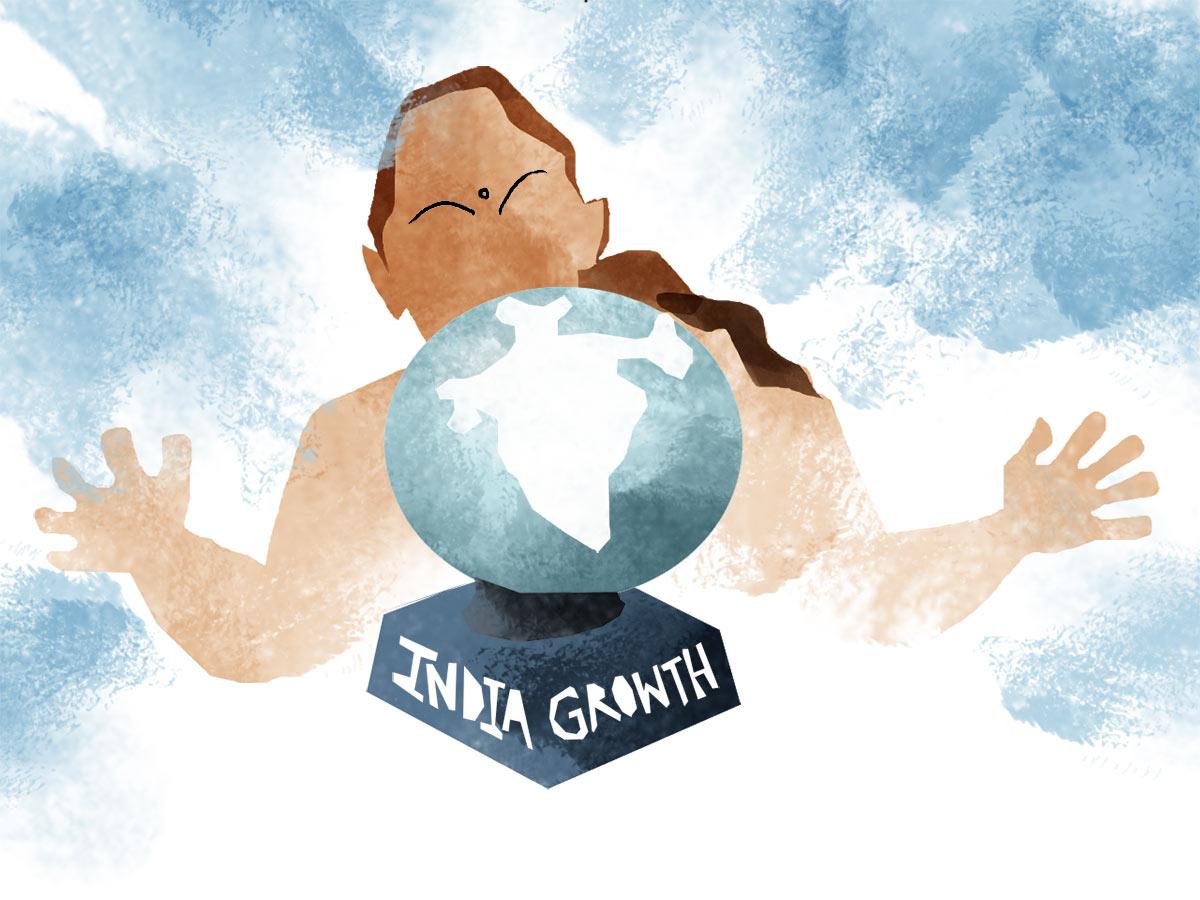India's Economy: Strong Reforms Fuel Growth - Jefferies
By Rediff Money Desk, NEWDELHI Feb 22, 2024 15:14
Jefferies predicts India will become the third largest economy by 2027, driven by strong reforms and favorable demographics. Read about the key factors driving India's economic growth.

Illustration: Dominic Xavier/Rediff.com
New Delhi, Feb 22 (PTI) Strong reform measures initiated by the Prime Minister Narendra Modi-led government in the last ten years have laid the foundation of a solid economic growth in coming decades, Jefferies Equity Research outlook said.
It also said that India would become the third largest economy by 2027 and expected to achieve a market capitalization of USD 10 trillion by 2030.
"With a consistent history of 10-12 pe cent CAGR (compound annual growth rate) over the last 10 and 20 years, India is now the fifth largest equity market and market cap will likely to touch USD 10 trillion by 2030," the report said.
It added that continued reforms should maintain India's status of being the fastest growing large economy.
Over the last 10 years, India's GDP has grown by 7 per cent CAGR in USD terms to USD 3.6 trillion, jumping from the eighth largest to the fifth largest economy.
"Over the next 4 years, India's GDP will likely touch USD 5 trillion making it the third largest economy by 2027, overtaking Japan and Germany, being the fastest growing large economy with the tailwinds of demographics (consistent labour supply), improving institutional strength and improvement in governance," it added.
Further, it said that GST implementation in 2017 simplified taxation and improved trade efficiencies, akin to the formation of Euro, and bankruptcy reforms drove a massive cleaning up of corporate and banking sector balance sheets and improved governance.
RERA (Real Estate Regulation Act) cleaned-up housing sector laying the foundation for a multi-year housing upcycle, it said, adding the government's focus on physical (roads, airports, railways etc) and digital infra (UID, UPI, DBT) has helped the startup ecosystem.
It added that India, with the highest population in the world, also features favourable demographics with a vibrant and young population, whose average age is just a tad below 30 years.
"The young demographics imply that the ratio of working age population is yet to peak, unlike several large economies and other comparable emerging market economies," it said.
The report added that a strong earnings growth profile, track-record of generating peer beating returns, rising India market weight and deep markets should attract incremental foreign flows.
"The Indian markets saw USD 20 billion of equity flows in 2023, though it was not as high as compared to previous levels as a percentage of market cap," it added.
It also said that India would become the third largest economy by 2027 and expected to achieve a market capitalization of USD 10 trillion by 2030.
"With a consistent history of 10-12 pe cent CAGR (compound annual growth rate) over the last 10 and 20 years, India is now the fifth largest equity market and market cap will likely to touch USD 10 trillion by 2030," the report said.
It added that continued reforms should maintain India's status of being the fastest growing large economy.
Over the last 10 years, India's GDP has grown by 7 per cent CAGR in USD terms to USD 3.6 trillion, jumping from the eighth largest to the fifth largest economy.
"Over the next 4 years, India's GDP will likely touch USD 5 trillion making it the third largest economy by 2027, overtaking Japan and Germany, being the fastest growing large economy with the tailwinds of demographics (consistent labour supply), improving institutional strength and improvement in governance," it added.
Further, it said that GST implementation in 2017 simplified taxation and improved trade efficiencies, akin to the formation of Euro, and bankruptcy reforms drove a massive cleaning up of corporate and banking sector balance sheets and improved governance.
RERA (Real Estate Regulation Act) cleaned-up housing sector laying the foundation for a multi-year housing upcycle, it said, adding the government's focus on physical (roads, airports, railways etc) and digital infra (UID, UPI, DBT) has helped the startup ecosystem.
It added that India, with the highest population in the world, also features favourable demographics with a vibrant and young population, whose average age is just a tad below 30 years.
"The young demographics imply that the ratio of working age population is yet to peak, unlike several large economies and other comparable emerging market economies," it said.
The report added that a strong earnings growth profile, track-record of generating peer beating returns, rising India market weight and deep markets should attract incremental foreign flows.
"The Indian markets saw USD 20 billion of equity flows in 2023, though it was not as high as compared to previous levels as a percentage of market cap," it added.
Read More On:
DISCLAIMER - This article is from a syndicated feed. The original source is responsible for accuracy, views & content ownership. Views expressed may not reflect those of rediff.com India Limited.
You May Like To Read
TODAY'S MOST TRADED COMPANIES
- Company Name
- Price
- Volume
- GTL Infrastructure
- 2.93 ( -4.87)
- 226206286
- IFL Enterprises
- 1.30 (+ 4.84)
- 81461564
- Vodafone Idea L
- 16.79 (+ 0.66)
- 67447398
- NCL Research
- 0.95 ( -4.04)
- 31996628
- Franklin Industries
- 3.73 (+ 3.32)
- 21511209
MORE NEWS

Navi Mumbai Airport ILS Signal Testing Begins
The Airports Authority of India (AAI) has begun ILS signal testing at the...

Air India VRS for Non-Flying Staff Ahead of...
Air India has announced a voluntary retirement scheme (VRS) and voluntary separation...
Fisher Groups Oppose WTO Fisheries Subsidy Talks
Small-scale fisher groups from India, Indonesia, and Bangladesh demand WTO keep...












 © 2024 Rediff.com India Limited. All rights reserved.
© 2024 Rediff.com India Limited. All rights reserved.